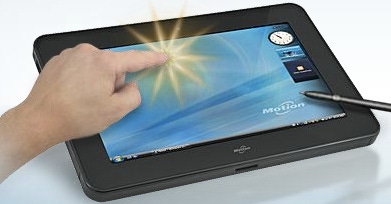I've railed against Windows 7 based tablets in the past, but that doesn't mean I don't think they don't have their uses. Take Motion Computing's offerings, for example: its tablets are super-light and super-rugged, perfect for healthcare and point-of-sale (POS) environments, where partner opportunities abound. Read on for the details.
January 27, 2011

 I’ve railed against Windows 7 based tablets in the past, but that doesn’t mean I don’t think they don’t have their uses. Take Motion Computing’s offerings, for example: its tablets are super-light and super-rugged, perfect for healthcare and point-of-sale (POS) environments, where partner opportunities abound. Read on for the details.
I’ve railed against Windows 7 based tablets in the past, but that doesn’t mean I don’t think they don’t have their uses. Take Motion Computing’s offerings, for example: its tablets are super-light and super-rugged, perfect for healthcare and point-of-sale (POS) environments, where partner opportunities abound. Read on for the details.
Motion Computing‘s focus has been on building rugged products for the POS computing world, as well as healthcare, construction and other business environments where a sensitive iPad might not fare well. “It’s going to get dropped, or wet, or disinfected,” said Mike Stinson, vice president of marketing at Motion Computing.”We’ve been doing tablets exclusively since 2001. They’ve all been slates — you need to have something to use while you’re standing, something you can hold in one hand.”
But I had to ask — why Windows 7? “It was a simple decision for us. Windows 7 has the infrastructure that makes it happen,” he said, referring to the integration and management in a corporate environment. And despite the differences in OS, the widespread adoption of iPads and Android tablets has actually made his company’s technology much more attractive, he noted. “People are much more comfortable touching a display. It’s really helped us, because we’ve spent a lot of time explain to people why you don’t need a keyboard.”
That mentality also make an easier sell for channel partners, who Stinson said are a key part of Motion Computing’s business. The company supports its channel base with its Motion Valued Partner program, which offers the usual bells and whistles such as marketing development funds, qualified leads, deal registration and more. “We sell almost exclusively through the channel and we work with around 400 ISV partners as well. Some resell, but others we work with because their software is what the customer wants to use. We we work together to make sure all the pieces come together,” he said.
Stinson noted the company is small and nimble enough that partners of any size can talk directly to Motion Computing if they need to. Plus, in the United States, Motion Computing is distributing through Tech Data, Synnex and Avnet, to just name a few.
And where should partners sell? “Health care is the largest vertical, and we have things that you wouldn’t see in a personal tablet like an optional barcode reader,” he said. “In our environment, reading a patient wrist badge or medicine is critical to work flow.”
Motion Computing recently unveiled its crown jewel, the CL900 (pictured) at CES 2011. It features a capacitive touch screen with a stylus, a 10-inch screen made with Gorilla Glass, and Intel’s latest round of Atom CPUs, and weighs in at just over 2 pounds. It is slated for availability in Q2 with a list price of just under $1,000.
Because Motion Computing is privately held, the company holds its financial numbers close to its chest. However, Stinson did note an uptick over the last 18 months in the POS space. Retail places in particular are switching to tablets from traditional cash registers – further proof of the opportunity for channel partners in the tablet space.
Even if you’re not selling Motion Computing’s technology, Stinson said, “Tablets are something you should be talking about.”
Sign up for The VAR Guy’s Weekly Newsletter, Webcasts and Resource Center. Follow The VAR Guy via RSS, Facebook and Twitter. Follow experts at VARtweet. Read The VAR Guy’s editorial disclosures here.
About the Author(s)
You May Also Like


